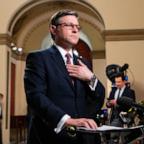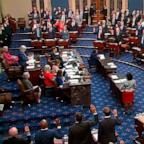Economic crystal ball foretells murky future
WASHINGTON -- When Faith Freeman of Primal Elements looks at her order books for the specialty soap and candle company, she sees one thing: caution.
Customers, particularly the mom-and-pop gift stores that make up the bulk of her business, are ordering fewer items at a time, placing, say, two 500-item orders in different weeks or months, rather than committing to one big 1,000-item order at the start. And this year they ordered far closer to Halloween, increasingly an important sales time.
That suggests to her that business owners, and their customers, are facing uncertain times. Seeing that has made her more cautious as well, particularly heading into the key holiday shopping season.
"We're supposed to be in these wonderful, affluent times, but people are feeling pinched," says Freeman, who started the Huntington Beach, Calif., company with her husband, Scott, in 1993. The housing slump, higher prices for a number of essentials, particularly gasoline, and news of layoffs are likely making people nervous, she says.
Federal Reserve Chairman Ben Bernanke and his colleagues meet Tuesday and Wednesday to discuss interest rates as the economy is indisputably slowing.
But it's uncertain how deep a decline is underway or how long it will last, making the economic crystal ball unusually murky. Further clouding the picture is the recent run-up in oil prices to near-record levels even when adjusted for inflation, a development that could slow consumer and business spending while also sparking inflation worries. That complicates matters for the Fed because the biggest issue for central bankers isn't where the economy is now, it's where it's going to be six months or a year away, when interest rate moves have had time to have real effects.
In a USA TODAY survey of 53 economists conducted Oct. 18-24, 62% said the economy was poised to get worse before it gets better.
"The best description I would give right now is, it's kind of like running in quicksand," says Richard Moody, chief economist at Mission Residential in Austin. "We have some forward momentum, but we could easily get dragged down by a number of factors."
The housing downturn will likely lead consumers to spend less well into 2008, he says. But Moody, like nearly every economist in the survey, still expects the downturn won't turn into a full-blown recession, arguing that consumers, the main engine of the economy, won't stop spending entirely.
Economists said there was a 25% chance of the economy sinking into recession in 2007 and a 30% chance of a recession in 2008. While the forecast for 2007 was identical to a USA TODAY survey conducted two months ago, economists increased the 2008 recession odds from 20% in the August survey.




